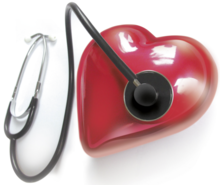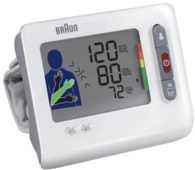Supports normal blood pressure
- Contains potassium which contributes to the maintenance of normal blood pressure
- Contains vitamin D which supports the maintenance of normal muscle function, including that of the heart muscle
- Also combined with the natural substances Q10 and pycnogenol
- Manufactured under Danish pharmaceutical control
- Scientifically documented
- Please note that this is a Dutch package
Bio-Bloodpressure (Bloeddruk)
| 1 tablet contains | % RDA | ||
|---|---|---|---|
| Potassium | 300 mg | 15% |
| 2 capsules contain | % RDA* | ||
|---|---|---|---|
| Co-enzyme Q10 (ubiquinone) | 100 mg | ** | |
| dissolved in vegetable oil | |||
| Pycnogenol® | 30 mg | ** | |
| Vitamin D3 | 20 µg | 400% |
* RDA = Recommended Daily Allowance
** RDA not established
Product Facts
Directions
2 capsules and 1 tablet per day unless advised otherwise. Preferably to be taken with or after a meal. Not suitable for children under 1 year of age.
Do not exceed the recommended daily dose.
A dietary supplement is not a substitute for a varied diet. A healthy lifestyle and a varied diet are important for maintaining good health.
Storage
Dark, dry and at room temperature.
Keep out of reach of young children.
Capsule Ingredients:
Palm oil, capsule shell: gelatin, humectants: glycerol, Coenzyme Q10 (ubidecarenone), color: ammonia caramel, purified water, Pinus pinaster A. (Pycnogenol), vitamine D (cholecalciferol).
Tablet ingredients:
Potassium (potassium chloride), bulking agent: microcrystalline cellulose, tricalcium phosphate, anti-caking agent: silicon dioxide, magnesium salts of fatty acids, glazing agents: calcium carbonate, hydroxypropyl methyl cellulose.
What is Bio-Bloodpressure?
Bio-Bloodpressure is a dietary supplement consisting of capsules and tablets. The capsules are dark brown gelatin capsules each containing a unique combination of coenzyme Q10, pycnogenol and vitamin D. The tablets are oval, white and contain a potassium salt.
Bio-Bloodpressure helps to maintain normal blood pressure and also normal muscle and nerve function.
What is potassium?
 Potassium is an essential mineral. Nearly all potassium (98%) is found inside the body's cells. Potassium is an electrolyte, which means it is an electrically charged atom that helps maintain the body's fluid and salt balance in collaboration with sodium. Excessive salt intake causes elevated sodium levels and water retention in the body. This leads to an increased blood volume which, in turn, raises our blood pressure. The more potassium we consume the more sodium is excreted in our urine. We get potassium from vegetables and fruit, fish, whole grains, and yogurt
Potassium is an essential mineral. Nearly all potassium (98%) is found inside the body's cells. Potassium is an electrolyte, which means it is an electrically charged atom that helps maintain the body's fluid and salt balance in collaboration with sodium. Excessive salt intake causes elevated sodium levels and water retention in the body. This leads to an increased blood volume which, in turn, raises our blood pressure. The more potassium we consume the more sodium is excreted in our urine. We get potassium from vegetables and fruit, fish, whole grains, and yogurt
What is Vitamin D?
Vitamin D is a lipid-soluble vitamin that is involved in a number of important functions in the body. It contributes to normal cell division, a normal immune system, normal muscle function, and normal uptake and utilization of calcium, etc.
There are several types of vitamin D. Bio-Bloodpressure contains vitamin D3. Depending on the measuring method, D3 is 56-87% more effective than D2 at raising vitamin D levels in the blood.
What is Co-enzyme Q10?
Coenzyme Q10 is a vitamin-like substance that is found inside the cellular mitochondria. The mitochondria are the minute powerhouses that convert nutrients from our food into ATP (adenosine triphosphate), a molecule that stores energy in its chemical form.
Muscle cells require extremely large amounts of energy and therefore contain significantly more mitochondria than other cell types. The cardiac muscle is a good example of a body tissue where the cells have higher mitochondrial density because of the huge energy requirements.
We are able to synthesize a small amount of coenzyme Q10 in the body. Our endogenous production peaks at the age of 20-25 years. From this point onward, levels of coenzyme Q10 continue to decrease.
Unique quality
The Q10 used in Bio-Bloodpressure is identical with the Q10 our body synthesizes. It is dissolved in a vegetable oil solution and exposed to a patented heating process that makes the Q10 molecules able to dissolve entirely at normal body temperature. This is the reason why the Q10 in Bio-Bloodpressure has such good absorption and bio-availability.
What is pycnogenol?
Pycnogenol also contains a variety of fruit acids, including caffeic acid, ferulic acid, gallic acid, coumaric acid, and vanillic acid. The extract is standardized to a 70%+/-5% content of some of the active plant substances. Pycnogenol has been on the market for over 40 years. The substance has been studied in a wide range of scientific studies.
Pycnogenol has antioxidant properties and has been labeled GRAS (Generally Recognized As Safe) by independent toxicology experts. This means that it is regarded as completely safe for human consumption.
What is blood pressure?

When the heart pumps (contracts) the blood pressure in the artery walls rises, and when the heart relaxes the pressure falls. The blood pressure during contraction is called the systolic pressure, while the pressure when the heart relaxes is called the diastolic pressure. A normal systolic blood pressure at rest should ideally be somewhere between 100-140, and the diastolic pressure should be in the range of 60-90.
If the blood pressure is higher than 140/90 mmHg at rest, it is considered high. High blood pressure rarely causes any symptoms.
Ways to maintain normal blood pressure
- Measure your blood pressure regularly
- Do not smoke
- Obtain a normal body weight
- Eat healthy food and reduce your intake of salt, fat, and calories
- Do not drink too much alcohol
- Exercise regularly
- Take Bio-Bloodpressure every day
Variations in gelatin hardness
The hardness of the soft gelatin capsules in Bio-Bloodpressure can vary. The difference depends solely on the water content of the capsule shell. We dry all our soft capsules before packaging, which makes the capsules firmer and facilitates the packaging process itself. Over time, the capsules can absorb water from the air, and this will soften the capsule shell.
The variations in the hardness of the capsule have no effect on the product quality, but if a hard capsule is a problem, a solution may be to leave the capsule outside the blister sheet for a day, whereby the capsule can absorb a little water from the air. This is generally not something we recommend, as the product will no longer be protected as when it is in the blister sheet. Another method of quickly softening the gelatin capsule is to place it in lukewarm water for one minute. However, it should be seen as an emergency solution.
Official claims
The European Food Safety Authority (EFSA) has evaluated the evidence behind some of the active ingredients and has acknowledged the following claims:
Potassium
- Contributes to the maintenance of normal blood pressure
- Contributes to normal functioning og the nervous system
- Contributes to normal muscle function
Vitamin D
- Contributes to normal blood calcium levels
- Contributes to normal absorption/utilisation of calcium and phosphorus
- Contributes to the maintenance of normal muscle function
- Has a role in the process of cell division and specialisation
Pycnogenol
-
contributes to the protection of cells from oxidative damage
-
contributes to the maintenance of normal blood circulation


